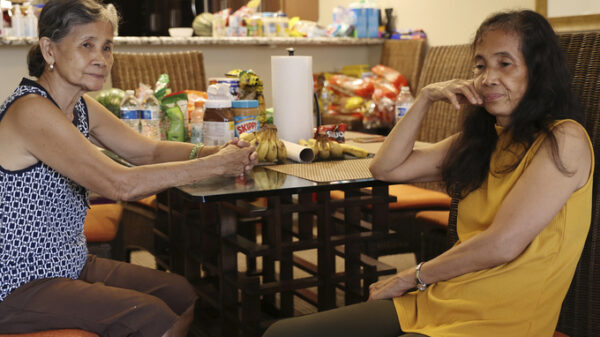People walk by an electronic stock board of a securities firm in Tokyo, Wednesday, Sept. 22, 2021. Asian shares were mostly lower on Wednesday after major indexes ended mixed on Wall Street.(AP Photo/Koji Sasahara)
Asian shares were mostly lower on Wednesday after major indexes ended mixed on Wall Street.
Benchmarks fell in Tokyo, Shanghai and Taiwan but rose in Sydney. Markets in South Korea and Hong Kong were closed for holidays.
The Bank of Japan kept its ultra-supportive monetary policy unchanged, as expected.
Investors are waiting to see the Federal Reserve’s latest assessment of the economy and keeping an eye on troubled Chinese developer Evergrande, which is struggling to meet debt payments.
A late-afternoon burst of buying on Wall Street faded in the final minutes of trading Tuesday, leaving the major stock indexes mixed. The S&P 500 ended down a bit less than 0.1%, and the Dow Jones Industrial Average fell 0.1%.
Tokyo’s Nikkei 225 index lost 0.6% to 29,665.42, while the Shanghai Composite index declined 0.8% to 3,585.24. Australia’s S&P/ASX 200 gained 0.5% to 7,310.10. Shares fell 2.4% in Taiwan and also declined in Singapore. But benchmarks rose in Indonesia and Malaysia.
The yield on the 10-year Treasury edged higher to 1.33% from 1.32% late Tuesday.
The Federal Reserve is expected this week to send its clearest signal yet that it will start reining in its ultra-low-interest rate policies later this year, the first step toward unwinding the extraordinary support it’s given the economy since the pandemic struck 18 months ago.
Wednesday’s Fed policy meeting could lay the groundwork for an announcement of a pullback in November.
Global investors also are watching nervously as Evergrande, one of China’s biggest real estate developers, faces a possible default on tens of billions of dollars of debt, fueling fears of possible wider shock waves for the financial system.
Chinese regulators have yet to say what they might do about Evergrande Group. Economists expect them to intervene if Evergrande and lenders can’t agree on how to handle its debts. But any official resolution is expected to involve losses for banks and bondholders.
On Tuesday, nerves appeared to steady after a selloff on Monday.
The S&P 500 fell 3.54 points to 4,354.19, while the Dow Jones Industrial Average dropped 50.63 points to 33,919.84. The Nasdaq composite rose 0.2% to 14,746.49.
Small company stocks also managed gains. The Russell 2000 index rose 0.2% to 2,186.18.
Health care stocks led the gainers Tuesday. Johnson & Johnson rose 0.4% after reporting that a booster of its one-shot coronavirus vaccine provides a stronger immune response months after people receive a first dose.
Several companies made solid gains after giving investors encouraging financial updates. Ride-hailing company Uber jumped 11.5% after telling investors that it could post an adjusted profit this quarter. Equipment rental supplier Herc Holdings rose 6.7% following a solid long-term growth forecast.
Supply chain problems, which have been hurting a broad range of industries, weighed on several companies. Homebuilder Lennar fell 0.5% after home deliveries for the third quarter fell short of analysts’ forecasts because of supply chain problems.
Universal Music jumped 35.7% in its debut on Amsterdam’s stock exchange.
In other trading, U.S. benchmark crude oil picked up 54 cents to $71.03 per barrel in electronic trading on the New York Mercantile Exchange. It gained 35 cents to $70.49 on Tuesday.
Brent crude oil, the standard for international pricing, added 42 cents to $74.78 per barrel.
The U.S. dollar rose to 109.42 Japanese yen from 109.23 yen late Tuesday. The euro was unchanged at $1.1726.
AP Business Writers Damian J. Troise and Alex Veiga contributed.
Copyright 2021 Associated Press. All rights reserved.
Source: https://apnews.com/article/business-china-japan-asia-tokyo-915c588ed46e4403aff86f0466f06214










































